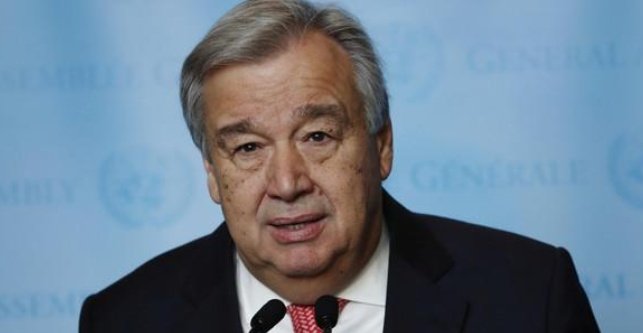UN chief urges nations to work together across borders on major challenges
Addressing a high-level meeting between the UN and the Shanghai Cooperation Organization (SCO), a regional bloc in Eurasia, Secretary-General António Guterres highlighted the complementary approaches between the two bodies, including preventive diplomacy, to address complex issues in the region.

- Country:
- Afghanistan
- Belarus
- China
- India
- Kazakhstan
- Korea Rep.
- Mongolia
- Pakistan
- Russian Federation
- Tajikistan
- Uzbekistan
Challenges such as climate change, violent extremism, illegal drugs and people trafficking, all require countries to work together across borders, to formulate creative and coordinated solutions, the United Nations Secretary-General said on Tuesday.
Addressing a high-level meeting between the UN and the Shanghai Cooperation Organization (SCO), a regional bloc in Eurasia, Secretary-General António Guterres highlighted the complementary approaches between the two bodies, including preventive diplomacy, to address complex issues in the region.
He said the UN was “committed to working closely with the SCO towards a stable and prosperous Eurasia region where people can enjoy peace, sustainable development and respect for human rights – the fundamental values that led to the development of the United Nations,” he said.
One of the key shared priorities, highlighted Mr Guterres, is greater inclusivity, particularly through greater engagement and participation of women and young people, especially in peacebuilding.
“Women must have a meaningful role in all peace processes,” said the UN chief, noting that women’s participation, at all levels, has “proven essential” to sustainable peace and resilient societies.
Youth, he continued, have “great potential” to promote peace and tolerance and champion innovation, recalling Youth2030, the UN Youth Strategy, which he launched in September.
“The empowerment of women and young people, in the broader context of a vibrant civil society, is a solid basis for peace and human security,” added the UN chief.
Mr Guterres also spoke of a partnership between SCO and the Turkmenistan-based UN Regional Centre for Preventative Diplomacy (UNRCCA), contributing to peace and stability in Central Asia, including in counterterrorism and prevention of violent extremism.
The close cooperation, extend beyond peace and security as well as the sub-region, he added, as shown by the close cooperation on economic and social matters between the UN regional commission for the Asia-Pacific region, ESCAP, and SCO as well as other parts of the UN system, such as the Food and Agriculture Organization (FAO) and the World Tourism Organization.
“This demonstrates the vitality of our interaction and the very close coordination of our common strategy,” he said.
Established in 2001, the SCO is a political, economic, and security alliance of countries in the Eurasia region. Its membership includes China, India, Kazakhstan, Kyrgyz Republic, Pakistan, Russia, Tajikistan and Uzbekistan. In addition, Afghanistan, Belarus, Iran and Mongolia are SCO observer states.
ALSO READ
Palestinians want April vote on UN membership despite US saying peace with Israel must come first
Jewish group launches Holocaust survivor speakers bureau to fight increasing antisemitism worldwide
Assam Rifles pays tribute to World War II veteran late Subedar Thanseia in Aizawl
World Bank, ARTF support financing for micro and small enterprises in Afghanistan
New World Bank program to expand electricity network through private sector participation in Ethiopia










